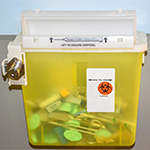This Model policy outlines the provisions to include in a patient termination policy. … [Read more...] about Model Policy: Patient termination
policy bank
Model Policy: Medications error reporting
Establishing a written Policy for dealing with medication errors is crucial. Although each practice will handle things differently, that policy should, like the Model Policy below, define “medication errors,” describe how those errors must be reported and to whom, and set out a procedure for assessment and analysis of medications error data generated by reporting. … [Read more...] about Model Policy: Medications error reporting
Model Policy: Progressive Discipline and Employee Termination
You must establish a written policy or procedure giving you the right to use progressive discipline. This Model Policy is a fairly generic version, which allows for warnings, followed by suspension and ultimately termination. But you’ll need to modify the Model Policy to reflect your own progressive discipline procedures and the terms of discipline provisions contained in any … [Read more...] about Model Policy: Progressive Discipline and Employee Termination
Model Policy: Patient Billings Collection and Financial Policy
The centerpiece of juggling all of these requirements is to establish a financial policy that tells patients how they will be billed for the services they receive. In addition to laying the legal groundwork for billing and collection, including by a third party collection agency, a well-crafted financial policy plays a key role in providing effective communications with … [Read more...] about Model Policy: Patient Billings Collection and Financial Policy
Model Policy: Patients Rights and Responsibilities
In addition to explaining patients’ rights and responsibilities, and thereby establishing the basis of a successful collaboration, this Patient Rights and Responsibilities Policy, helps your practice comply with U.S. law called the 1998 Patients’ Bill of Rights Act. … [Read more...] about Model Policy: Patients Rights and Responsibilities
Model Policy: OSHA Bloodborne Pathogens Exposure Control
All medical practices need infection control policies and procedures. And with regard to one particular form of infection— bloodborne pathogens that get into the bloodstream via puncture or piercing by contaminated needles or other medical sharps— QA measures must include a specific exposure control policy that meets the requirements of the federal workplace safety law called … [Read more...] about Model Policy: OSHA Bloodborne Pathogens Exposure Control
Model Policy: Sexual harassment
Why you need this policy: Personnel issues are among the most difficult problems faced by medical practice management. And few personnel issues are any tougher than sexual harassment. How this policy helps you: The starting point in managing sexual harassment is to establish a clearly written, specific policy that includes a/an: Policy statement indicating that sexual … [Read more...] about Model Policy: Sexual harassment
Model Policy: Patient scheduling and appointments
Why you need this policy: Getting patients to properly make and honor their appointments is a challenge faced by just about all practices. Although no-shows, walk-ins, and late appointments can’t totally be prevented, establishing a clear set of ground rules for the making and keeping of appointments can minimize them and establish your right to charge fees and take other … [Read more...] about Model Policy: Patient scheduling and appointments
Model Policy: Computer use and social networking
Why you need this policy: The law governing your right to discipline employees for the things they say on blogs and social networks is still in its infancy stages. But even from the early cases, it has become clear that online conversations are not simply private matters. There’s a big difference between bad-mouthing a company, supervisor or colleague to a friend over coffee … [Read more...] about Model Policy: Computer use and social networking
Model Policy: HIPAA notice of privacy practices
Why you need this policy: HIPAA requires medical practices to prepare and post a Notice of Privacy Practice (NPP) notifying patients of their rights to their own personal health information (PHI) and how the practice uses and discloses the PHI it collects from patients. The NPP is as old as the HIPAA law itself; but recent changes (contained in a law called the HITECH … [Read more...] about Model Policy: HIPAA notice of privacy practices









